Exploring the Unique Culture of Rajasthan’s Bhil Tribe
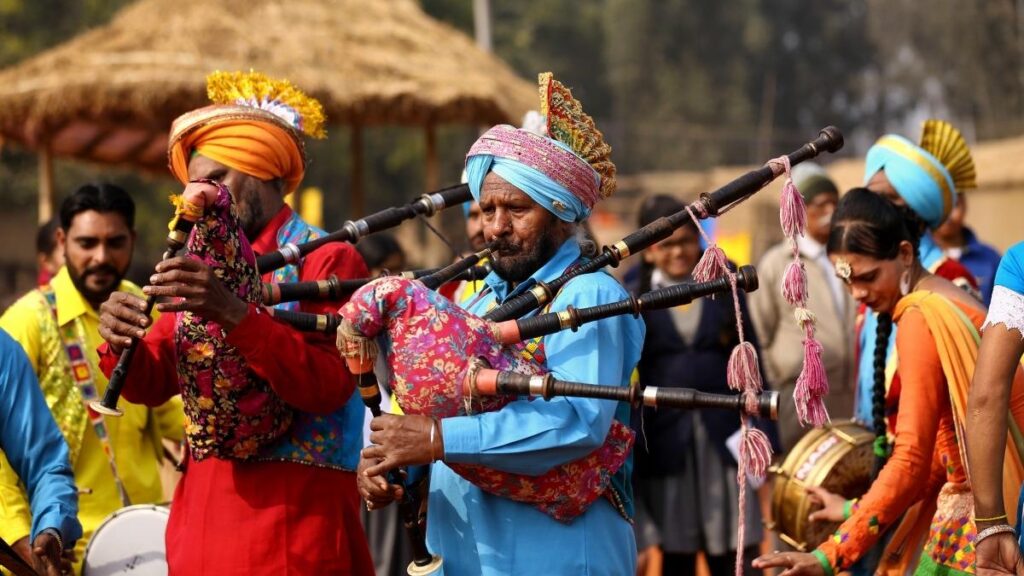
Bhil Tribe Function (Courtesy: Rajasthan Tourism)
Rajasthan, celebrated for its grand forts, desert landscapes, and regal history, holds within its realm a distinct cultural group – the *Bhil tribe*. These people are more than just a community; they embody a living link to Rajasthan’s ancient past and its exceptional traditions. With a heritage that spans generations, the Bhil tribe weaves an essential thread in Rajasthan’s social fabric, enriching the diverse cultural mosaic of the region.
Unveiling the Origins of the Bhil Tribe
Rajasthan’s Bhil tribe is one of the largest native communities of India, bringing a special essence to the nation’s ethnic diversity. They are also situated across various parts of India; their existence can be said to be particularly strong in the western states of Rajasthan, Gujarat, and Madhya Pradesh. The name “Bhil” emerges from ancient Sanskrit which signifies “archers” or “bowmen,” which shows their historical reputation as skilled hunters and Fighters.
Their origins are akin to peering through the veil of time. The Bhil people have an enduring presence, an integral part of India’s tapestry. They have held onto their distinctive way of life while adapting to changing circumstances.

The Heartbeat of Bhil Culture and Traditions
The Bhil tribe’s culture is an intricate blend of customs, beliefs, and practices that deeply root them in the land. Nature holds profound significance for them, and they offer reverence to deities tied to forests, rivers, and mountains. Among these, the Goddess *Bhilamata* occupies a special place, embodying concepts of fertility, protection, and overall well-being.
When it comes to celebrations and expression, the Bhil people turn to the medium of music and dance. The enchanting *Ghoomar* dance takes center stage during Bhil festivities, characterized by graceful twirls and vibrant attire. Yet, their artistic endeavors don’t stop there – their tattoos, clothing, and jewelry all narrate stories that form an integral part of their cultural identity.
Life and Livelihood
In the past, the Bhil tribe relied on hunting and gathering to sustain themselves. Later, they changed over and settled in doing agriculture, cultivating crops like millet, maize, and pulses. Animal husbandry, especially the rearing of goats and buffaloes, is another basic characteristic of their lifestyle. The deep connection with the nature is evident in their ample knowledge of local flora and fauna, which often finds its way into their traditional medicinal practices.
Amidst changing times, many Bhils have maintained their traditional occupations, while others have embraced modern pursuits. However, their cultural heritage remains an integral part of their identity, passed down through generations as a testament to their resilience.
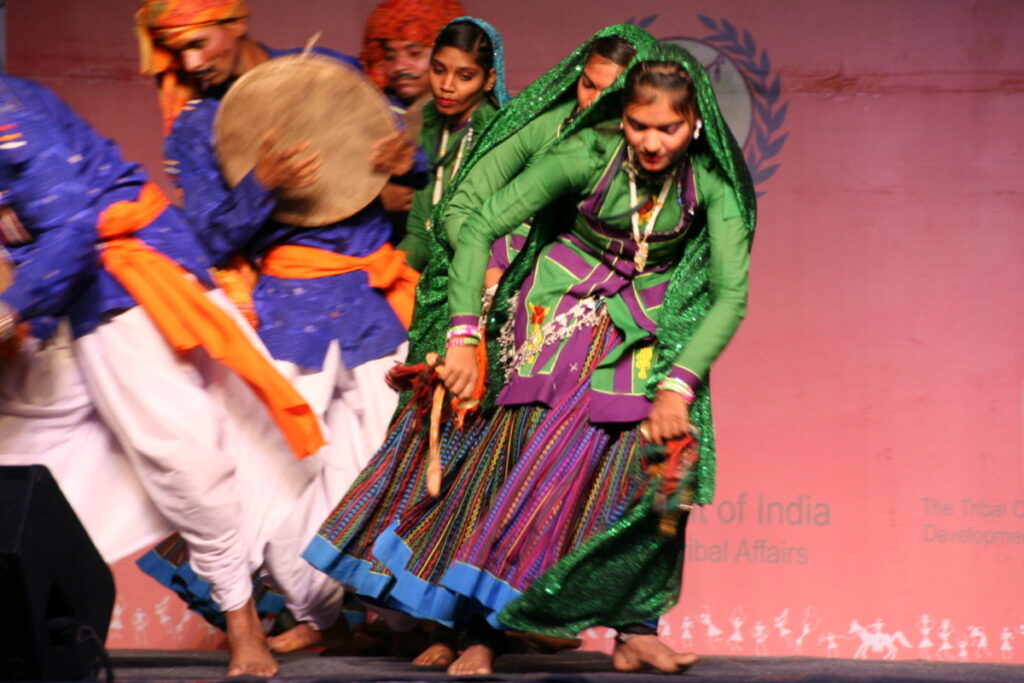
Overcoming Challenges and Embracing Change
Much like other indigenous communities, the Bhil tribe has confronted challenges such as marginalization, economic disparities, and limited access to education and healthcare. Recent years have witnessed concerted efforts to address these issues and safeguard their cultural legacy. NGOs, government initiatives, and community-led programs have collectively worked towards enhancing the Bhil tribe’s quality of life, focusing on education, healthcare, and sustainable development.
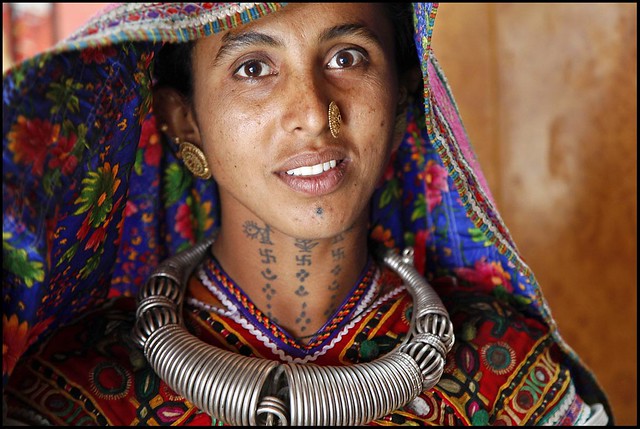
Preserving and Sharing the Bhil Legacy
The Bhil tribe’s distinctive heritage is a repository of knowledge, art, and spirituality. As Rajasthan strides into the future, it becomes imperative to honor and celebrate the Bhil culture. Initiatives that foster cultural exchange, tourism, and artistic endeavors can serve as a platform for the Bhil tribe to showcase their traditions to the world, fostering understanding and appreciation.
The Bhil tribe represents more than a mere community; they are the torchbearers of a cultural legacy that spans generations. Through their melodies, dance, artistic expressions, and daily lives, the Bhils offer us a window into a world deeply entrenched in tradition yet open to evolution. As we delve into Rajasthan’s history, let’s acknowledge the profound contributions of the Bhil tribe, who have etched an enduring imprint on the state’s vibrant cultural tapestry.


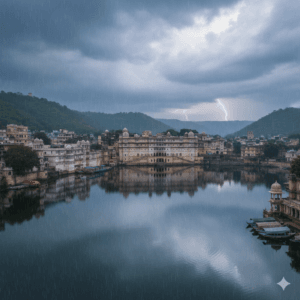


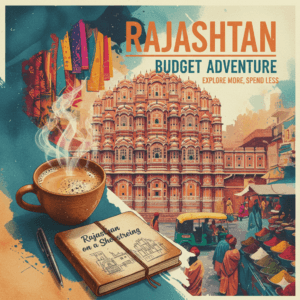
Your point of view caught my eye and was very interesting. Thanks. I have a question for you.
I don’t think the title of your article matches the content lol. Just kidding, mainly because I had some doubts after reading the article. https://accounts.binance.info/ru-UA/register?ref=JVDCDCK4
Your article helped me a lot, is there any more related content? Thanks!
Thank you for your sharing. I am worried that I lack creative ideas. It is your article that makes me full of hope. Thank you. But, I have a question, can you help me?
Thank you, your article surprised me, there is such an excellent point of view. Thank you for sharing, I learned a lot.
I don’t think the title of your article matches the content lol. Just kidding, mainly because I had some doubts after reading the article.
Your point of view caught my eye and was very interesting. Thanks. I have a question for you.
Thank you for your sharing. I am worried that I lack creative ideas. It is your article that makes me full of hope. Thank you. But, I have a question, can you help me?
Can you be more specific about the content of your article? After reading it, I still have some doubts. Hope you can help me.
Thanks for sharing. I read many of your blog posts, cool, your blog is very good.
We are staying in Jaipur and Suroth Mahal, in March and are interested in visiting tribe vilalge